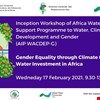
/ Mediterranean
Sustaining Lebanon’s Coast: A Holistic Approach
The Integrated Management Plan for the Damour area in Lebanon under the GEF UNEP/MAP Programme, sets the paradigm for system-wide perspectives across geographical zones in natural resources management, promoting sustainable development, building climate resilience and protecting habitats across the Mediterranean region.
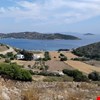
/ Mediterranean
An island community mobilising to save water in Lipsi, Greece
Reckitt's Finish and GWP-Med implement the 4th year of the "Water Is In Our Hands" initiative in the Greek island of Lipsi, providing concrete tools to combat water scarcity and save water at home.
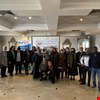
/ Mediterranean
Capacity building trainings for the AIP WACDEP-G multi-stakeholder group on gender equality and gender transformative planning for climate- resilient water investments in Tunisia
Through an inclusive multi-stakeholder approach, the AIP WACDEP-G programme aims to actively engage public sector policy and decision makers in its implementation. Targeted capacity building is a core element to ensure active engagement and a sense of ownership by stakeholders.

/ Mediterranean
Coming together for sustainable development in the Drin River Basin; Five key lessons from Southeastern Europe for successful transboundary cooperation
Covering a geographical area of 20,361 km2 connecting 5 countries and 5 water bodies, the Drin Basin in Southeast Europe sustains unique ecosystems and endemic biodiversity, while supporting the economic activity of over 1.6 million people who call it home. However, four transboundary problems - deterioration of water quality, variability of hydrological regime, biodiversity degradation and disturbance of the natural sediment transport regime - are threatening the basin’s health with a direct impact on both the environment and livelihoods.
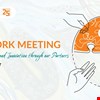
/ Mediterranean
GWP-Med’s success stories presented at the Thematic Sessions of GWP’s 2021 Network Meeting of Partners
The GWP 2021 Network Meeting of Partners took place online on 1 & 2 December under the Theme “Leading Change and Innovation through our Partners”. GWP-Med was actively involved, presenting examples of success stories from its work around the Mediterranean in several Breakout Sessions.
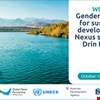
/ Mediterranean
Workshop on Gender Equality for sustainable development in Nexus sectors in Drin Riparians
An online Workshop on “Gender Equality (GE) for Sustainable Development in Nexus sectors in Drin Riparians” took place on 12 October 2021 with the participation of around 55 representatives from different gender related institutions and nexus related sectors, gender focal points, civil society, academia, women empowerment activists and experts from Albania, Kosovo* and North Macedonia. Its overall purpose was to bring these actors together to discuss challenges and opportunities for promoting gender equality as a driver for sustainable development in Drin Riparians.
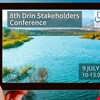
/ Mediterranean
The end of the GEF Drin Project finds the Drin Riparians stronger and marks the beginning of a new phase in cooperation
The Drin Riparians and their partners pointed towards enhanced forms and arrangements of transboundary cooperation.
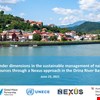
/ Mediterranean
Gender dimensions in natural resources management: 'Women in the Drina River Basin have the power to solve environmental threats'
Stakeholders from the political sphere, scientists, activists, and professionals that participated at the online workshop “Gender dimensions in the sustainable management of natural resources through a Nexus approach in the Drina River Basin” acknowledged the fact that women are disproportionately affected by natural disasters and should have a more active role in decision making on environmental issues.

/ Mediterranean
Launching: the Drin Animated Story!
It is with great pride that we present the Drin Animated Story! A series of 4 animation videos will take you on a journey through the Drin’s complex water system and the challenges it faces.
